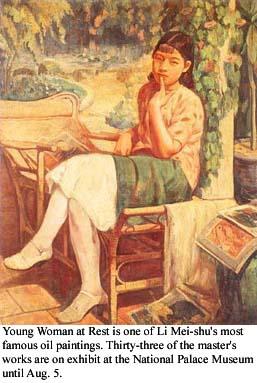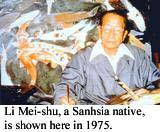 The year 1902 was an auspicious one for Taiwanese art, as it is the
birth date of three of the country's master painters -- Li Mei-shu (李梅樹),
Liao Chi-chun (廖繼春), and Chang Wan-chuan (張萬傳). Of these
three, Li is the first to be honored with a solo exhibition at the palace
museum in commemoration of the 100 years since his birth (if you use the
Taiwanese method to count age).
The year 1902 was an auspicious one for Taiwanese art, as it is the
birth date of three of the country's master painters -- Li Mei-shu (李梅樹),
Liao Chi-chun (廖繼春), and Chang Wan-chuan (張萬傳). Of these
three, Li is the first to be honored with a solo exhibition at the palace
museum in commemoration of the 100 years since his birth (if you use the
Taiwanese method to count age).
The exhibition showcases 33 of his watercolor and oil paintings on
loan from the Li Mei-shu Memorial
Gallery (李梅樹紀念館) in Sanhsia (三峽), Taipei County.
Produced between 1920 to 1980, the artwork on view includes many of Li's
famous portraits of his female relatives. The best known of these is the
prize-winning Young Woman at Rest (小憩之女)
from 1935, which is a portrait of Li's daughter-in-law Liu Tseng-mei (劉曾妹).
This painting is famous for the lady's vivid gesture of raising her
forefinger daintily touching her lip. In a nod to his impressionist
forebears, Li snuck reproductions of paintings by Renoir and Van Gogh into
the foreground of the portrait.
 Another eye-catching portrait is that of the artist's first daughter Li
Li-hsia (李麗霞) titled Seated Lady
3 (小憩三). It's was a Li family custom for the daughters to sit
for a portrait before their marriages so that the family could keep an
image of their child. Each daughter would also be given a portrait with
roses as an auspicious symbol for fortune and well-being. This painting is
also known for the dolls in the background, which reveal the daughter's
profession as a doll maker.
Another eye-catching portrait is that of the artist's first daughter Li
Li-hsia (李麗霞) titled Seated Lady
3 (小憩三). It's was a Li family custom for the daughters to sit
for a portrait before their marriages so that the family could keep an
image of their child. Each daughter would also be given a portrait with
roses as an auspicious symbol for fortune and well-being. This painting is
also known for the dolls in the background, which reveal the daughter's
profession as a doll maker.
Many of Li's portraits seem almost photographic in their precision,
especially Li's portrait of his third daughter-in-law titled Enjoying
the Water (戲水). The sunlight seems to sparkle as the lady plays
with the water and as the viewer walks around the painting the woman
seemingly turns her eyes and body around to follow you.
Li had no shortage of subject matter, with five daughters and three
sons and a large extended family. When the show opened May 4, over 70 of
Li's children, grandchildren and relatives, including eight women who were
subjects of his paintings, were on site at the Palace Museum with
President Chen Shui-bian (陳水扁).
Li's children have been especially active in the preservation of
their father's artistic legacy, opening a gallery in Sanhsia in 1995 with
about 500 works, and they were the driving force behind his exhibition.
Li's status in art history, however, goes beyond portraits of his
family members. He is an earnest realist with a genuine concern for
society conveyed through his paintings that show life during the
transitional period when Taiwan returned from Japanese rule. One
representative piece from this period is At
Dusk (黃昏) from 1948. The painting is a heroic depiction of female
peasants toiling with their spirit unbroken through hard times and is
often compared to Jean Francois Millet's famed piece The Gleaners.
Also featured in the Palace Museum exhibit are beautiful landscape
paintings of Sanhsia, Li's hometown. These serve as a fine reminder of an
idyllic countryside. Morning Along the
River (河邊清晨) and Spring
Morning in Sanhsia (三峽春曉) depict scenes of people lingering
along the Tamsui River banks in an ode to the land and the people.
As well as being an artist, Li was also an educator, who, between
1963 and 1973 served as dean of the fine arts department at the National
Taiwan Institute of Art. He once served as the chairman for his hometown's
assembly and then as a Taipei County councilman and was an active force in
preserving cultural heritage sites. One major project he participated in
was the reconstruction for the Tsu-shih Temple (祖師廟) in Sanhsia, to
which he dedicated his energy for almost 40 years until he passed away in
1983.
The Li Mei-shu Memorial Gallery in Sanhsia is open to the public
only on Saturday and Sunday from 10am to 4:30pm. Guided tours are also
available on weekdays to groups upon reservation. Call 2673-2333 for more
information.
Art Notes:
What: Portraits of the Land and People: A Centennial Exhibition in
Commemoration of Li Mei-shu (1902-1983) (人親土親:李梅樹百年紀念特展)
Where: Gallery 104, National Palace Museum (故宮博物院104室),
221 Chihshan Rd., Sec. 2, Shihlin, Taipei (士林至善路二段221號)
When: Until Aug. 5
back
| 
